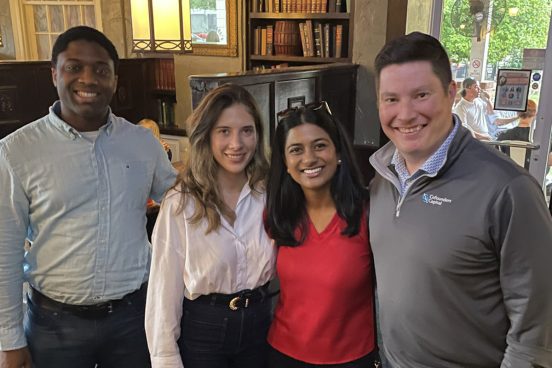Duke Daytime MBA Student Blog

The Challenge
Finding the Next Great Start-Ups
The entrepreneurial spirit, it is said, is the lifeblood of the American economy. A passion for invention, reinvention, and innovation is what has distinguished us; the United States has the type of economic climate that allows people to fail in pursuit of success, to take risks that may seem insane to those not in the know. Even some of America’s most noteworthy icons of innovation were first afterthoughts with bad ideas. That spirit has been galvanized even more in recent years, as high-profile start-up ventures have taken corporate America by storm, and invigorated it with an infusion of youth and diversity. Numerous platforms for innovation have flattened the figurative playing field.
Duke, it seems, produces a disproportionately high number of these great ideas. Located in the fertile Research Triangle, and equipped with world class thought leaders and practitioners, this shouldn’t be surprising, but Duke has shown real initiative in developing a springboard for ideas. The Duke Start-Up Challenge is just one such ongoing initiative, and the semi-finals round of the competition took place today.
The event is, if nothing else, very inclusive; whereas media outlets may equate ‘entrepreneur’ with ‘technology,’ the start-up challenge also included separate categories for healthcare, energy, media, and social ventures, as well as women-led initiatives and undergraduate teams. For those who believe that business education is based on antiquated principles or archaic texts, this event seemed to provide evidence to the contrary; indeed, even though the ingenuity belonged to the students, many of them were openly grateful to their faculty at Fuqua for helping them build workable business models and extract ideas from their own experiences.
For me, however, the event had a different feeling, and I’d have to guess that I wasn’t alone. As someone who has worked in the buttoned-up worlds of consulting and auditing for five years, where innovation and creativity tend to lead to illegal activities, it provided affirmation that even seemingly humble ideas can have a meaningful impact when thoroughly vetted and challenged by questioning, yet supportive minds. It was evidence that even seemingly frivolous ideas, such as the ones that run through my head every day, can actually have some merit if positioned strategically.
From here, a select few participants will be chosen to present in next week’s finals, with the very best and most promising idea to be named and awarded a plentiful sum of startup cash by noted entrepreneur and Duke alumnus JB Pritzker during a finale event in early April. This event is frequently surrounded by a great deal of hoopla (last year, members of the championship winning basketball team served as entertainment), but it’s certainly not done as a measure of self indulgence. Innovation, it seems, is something that, as Americans, is in our heritage, and it’s something that we should get excited about, as classmates in our midst get ready to usher in the next generation of great entrepreneurial ideas. And it’s imperative to remember that even the most audacious of success stories don’t manifest overnight, and sustained enthusiasm is imperative for winning in the long run.



